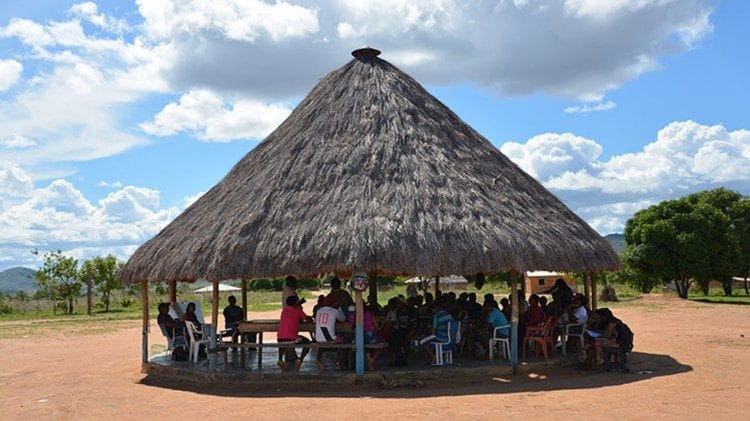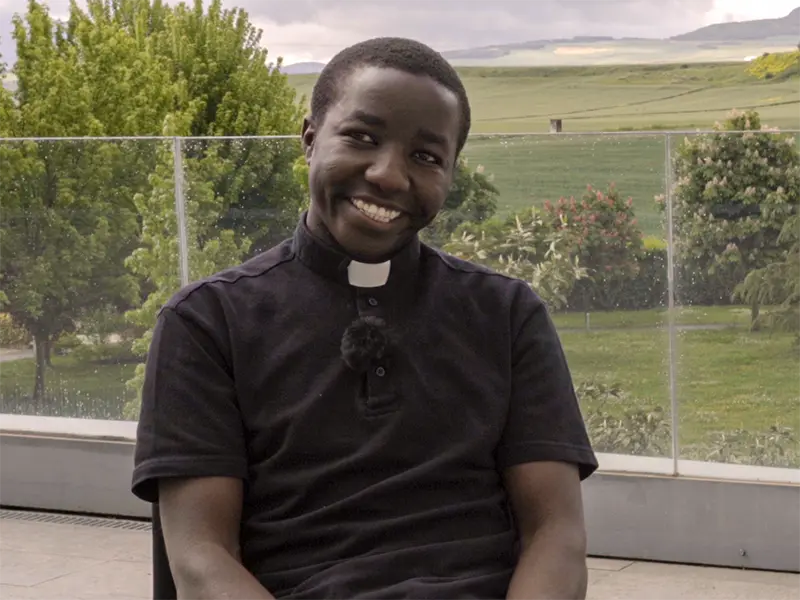The Irreplaceable Role of Missionaries
Presentation of World Mission Day, ‘The Mission Is Always Founded Spiritually on the Experience of Jesus,’ says Cardinal Tagle

The irreplaceable role of missionaries emerged today during a conference ahead of World Mission Day.
A verse taken from the Acts of the Apostles, “We cannot be silent about what we have seen and heard,” is the theme chosen for the forthcoming World Mission Day, which will be observed on October 24. The event was presented in the course of a press conference by Cardinal Luis Antonio G. Tagle, Prefect of the Congregation for the Evangelization of Peoples; by Monsignor Giampietro Dal Toso, President of the Pontifical Mission Societies, Assistant Secretary of the same Congregation, and by Sister Alessandra Dalpozzo, Mother General of the Franciscan Handmaids of Mary, a meeting from which the irreplaceable role of missionaries emerged, bearers of Christ’s peace in the world.
After the presentation of a brief video that “promotes” the missions in the world, the Philippine Cardinal suggested some reflections on the text of the Holy Father’s Message, published at the end of January, beginning with the episode in the Acts of the Apostles, in which Peter and John are the protagonists.
Experience of Jesus
“It’s not an ideal or romantic story, but must be placed in the context of the proclamation of the Word and of the persecution, which continues also today,” said Cardinal Tagle. “The Pope has focused on a valid theme for all missionary undertakings. What is the secret of this zeal and of the joy of the Apostles that we ourselves must have? The Pope answers that it stems from having experienced the love of God in Jesus, having lived Jesus’ friendship, having seen how He touched the sick . . . There were difficulties, but the gift of Jesus overcame the difficulties to be endured. They saw with their eyes that things could be different, as Jesus had inaugurated a new era, a future in which all placed their hopes. The experience of Jesus leads to the missionary state.” That, stressed the Prefect, “is an expression of gratitude, it’s not a weight, it does not have only a pragmatic-functional end.” The missionaries bring the Gospel of compassion and hope.”
A Gift to Share
Cardinal Tagle also reminded that the Pope said: “We cannot have the Lord for ourselves, we must share Him. The more we share the faith, the more it grows; if we keep it for ourselves it becomes weak, and if we keep it in the ambit of a small group it can become elitist. The mission is always founded spiritually on the experience of Jesus, who makes us come out of ourselves to share it with all. Jesus is in need of hearts that are able to express the vocation as a true story of love and fidelity beyond suffering,” he concluded. It is a role that all missionaries are called to carry out.
Monsignor Dal Toso projected the Mission Day to a series of events of the forthcoming year linked “to the missionary world: 400 years of the Congregation, 200 from the foundation of the first Missionary Society, the Work of the Propagation of the Faith, 100 years of the elevation to Pontifical status of three of our four Societies, 150 years from the birth of the Founder of the Pontifical Mission Union.” In this context, next May 22 the Beatification will take place of Pauline Jaricot, Foundress of the first Society, who died in 1862. Monsignor Dal Toso focused his intervention on this figure, sketching three aspects of her.
A Young Woman
“The first is that she was a young woman. There is ample talk these days of the promotion of women in the Church. A glance at history tells us that women have had an enormous impact on the life of the Church and this is one of those examples that shows how a real inspiration finds room in the Church, precisely because it comes from a woman, a woman that never entered the convent.
A Great Missionary
The second aspect is that “Pauline was a great missionary. It seems important to me to highlight that the key of comprehension to understand this woman was her missionary anxiety. The Society for the Propagation of the Faith and before that, her prayer circles for the mission, the living Rosary, her attempt to build an ideal factor to meet the spiritual needs and to promote the dignity of the works of the time, all was done to evangelize the French environment and to support the mission in a period of strong de-Christianization after the French Revolution. I believe it can be said, and it’s also the heart of the Pontifical Mission Society is, that she wanted to involve the mission in distant lands to evangelize in close lands.
A Seed that Bore Fruit
Finally, “Pauline was a seed of which a great tree was born. She is not only exceptional for the holiness of her life, but for the greatness of the fruits of her work. She set in motion a true spiritual missionary movement thanks to the Society for the Propagation of the Faith, which had an immediate and capillary diffusion, also because it was built on a simple but brilliant system: groups of 10 people, who then gathered in 100 and then in a thousand with a person in charge at every level.
Not even a year after the Society was recognized by Pius VII, in 1825 the King of France took it under his protection with a gift of 4000 francs. If in 1822 it collected 22,915 francs, in 1838 it was already 1,343, 000 francs and two years later, 2.5 million of which 45% was collected outside of France. From the calculations made, they corresponded at least to 50 million euros at present.” Pauline’s example led Monsignor Forbin-Janson to apply this model to the nascent Society of Missionary Childhood. “The contribution of the Societies, which owed their origin to this intuition, was essential for the history of the missions in the 19th and 20th centuries,” said Monsignor Dal Toso, “because they involved the grassroots of the Catholic faithful and sensitized them to the mission.”
An “effect” that still lasts today: “in the current year, with a contribution the Society for the Propagation of the Faith has supported the current expenses of 893 ecclesiastical circumscriptions in mission territories and has invested over US$10 million for the formation of catechists, while the Society of Saint Peter the Apostle has financed the formation of 76,541 seminarians and 746 Seminaries.”
A Concrete Experience
Sister Alessandra Dalpozzo talked, instead, about the experience, born from a request of the Bishop in 2010, of the initiative started at Atambua, in the Island of Timor, with two boarding schools that house numerous girls “to whom we hope to offer soon a healthier environment and more consonant for their growth,” an experience in which new vocations flowered.
The women religious have also succeeded in building a chapel, given the growth of the activities and of the community, dedicated to Saint Mary of the Snow, located in the center of the village. “It is the community’s place of prayer, of some stages in their consecrated life, where Marriages and Baptisms are celebrated, which hosts activities with girls of the boarding school or the preparation for the Sacraments. Important moments of the life of the people of Atambua, with the sole objective to bring peace, which is the gift of Christ, dead and risen for us.”
New Technologies for Missionaries
Monsignor Dal Toso also stressed the effort that the National Directorates are doing to work much more on the digital, as the video presented also shows. Moreover, during the lockdown, an appropriate fund was created which supported, for example, the local radios, to help the parishes in mission countries, especially in Africa where radios are an essential instrument for missionaries. However, he said, echoing what Cardinal Tagle affirmed, “there it is a means that cannot substitute the personal, face-to-face approach. There has been a flowering in our churches because there were missionaries that spent themselves, and when a person spends himself, there is a return.”
Translation by Virginia M. Forrester
Related

Reflection by Bishop Enrique Díaz: Alleluia, alleluia
Enrique Díaz
20 April, 2025
5 min

Christ is Risen! Alleluia! Commentary by Fr. Jorge Miró
Jorge Miró
20 April, 2025
3 min

Easter: Mystery of Freedom
Carlos J. Gallardo
20 April, 2025
5 min

“Being Catholic in Tanzania is a source of pride”
Fundación CARF
16 April, 2025
6 min
 (EN)
(EN)
 (ES)
(ES)
 (IT)
(IT)

